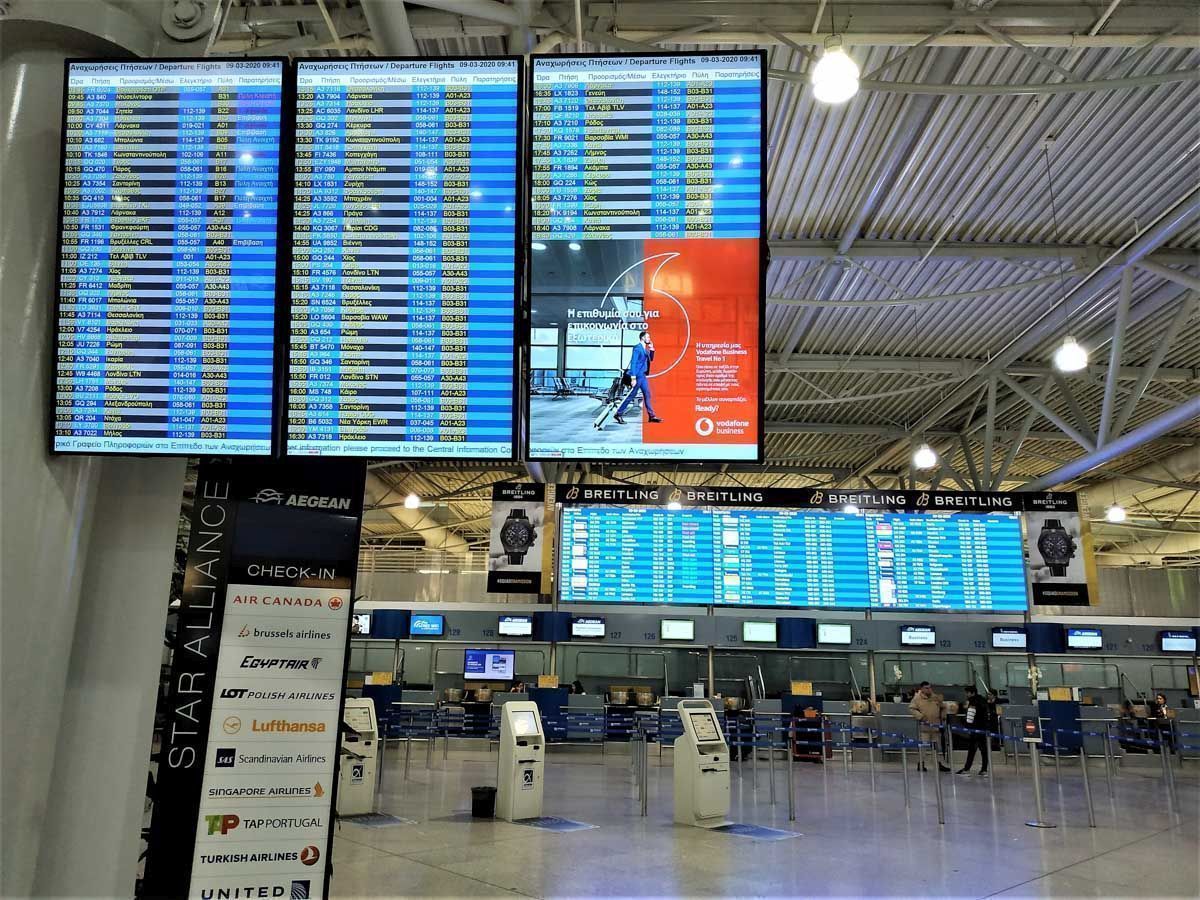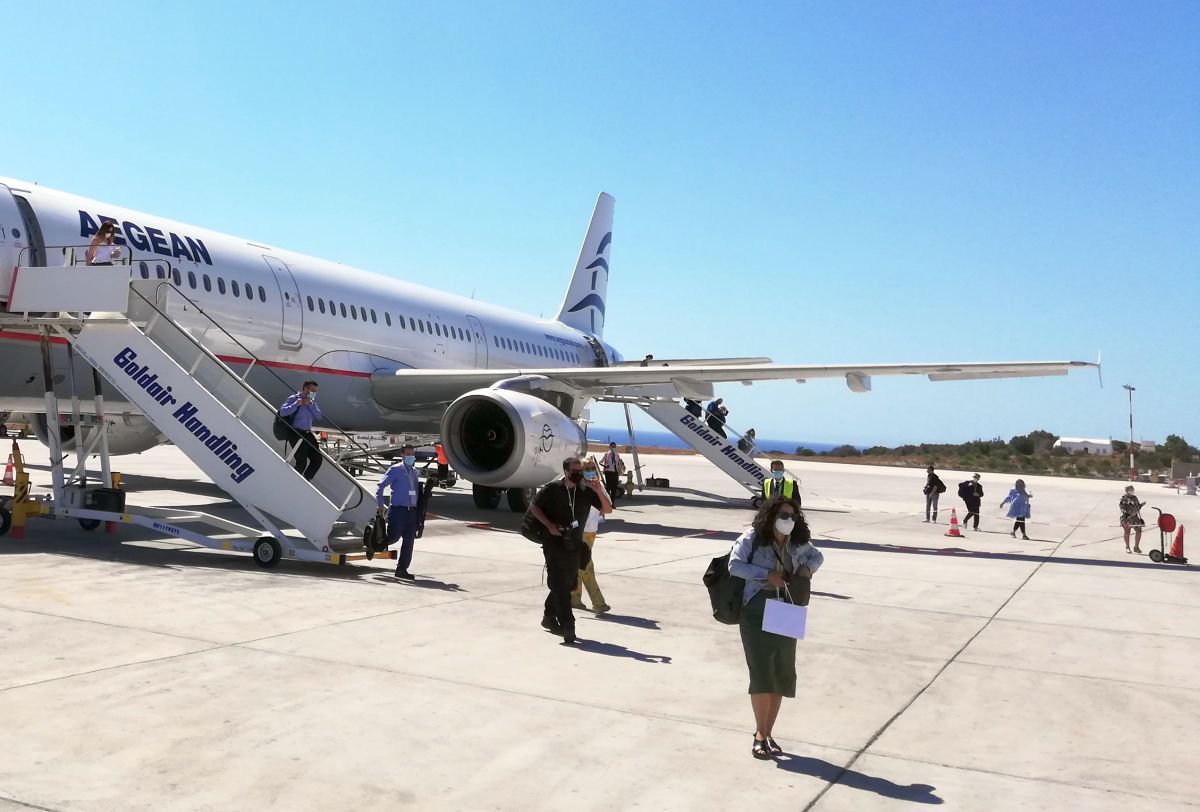Greece Extends Covid-19 Rules for International and Domestic Travelers
UPDATE: On June 18, the Greek Tourism Ministry announced that authorities will allow entry to travelers who present negative rapid antigen tests on arrival, as proof that they are not infected with the Covid-19.
The Hellenic Civil Aviation Authority (HCAA) has updated its Covid-19 aviation directives (NOTAMS) and extended travel rules for passengers of international and domestic flights in Greece.
Travel rules for international arrivals
The HCAA’s update for its Covid-19 aviation directives extends travel rules for passengers and restrictions for all international flights until Monday, June 21, at 6 am.
Who is allowed entry to Greece
People traveling for essential reasons and travelers from the following countries* are allowed to enter Greece – provided they have the required documentation – without the requirement for subsequent self-isolation: EU & Schengen Area countries, Australia, Northern Macedonia, United Arab Emirates, United States of America, United Kingdom, Israel, Canada, Belarus, Bahrain, New Zealand, South Korea, Qatar, China, Kuwait, Ukraine, Rwanda, Russia, Saudi Arabia, Serbia, Singapore, Thailand, Bosnia-Herzegovina and Montenegro.
* Regulations concerning countries on the admission list are subject to change by the Greek authorities, when renewed assessments are made based on epidemiological data from country of origin.
Entry requirements
Greece will allow entrance to travelers that have filled out the Passenger Locator Form (PLF) one day before travel. The PLF is mandatory and must be filled out by all travelers, regardless of their nationality.
Passengers from abroad must also have one of the following:
1. a vaccination certificate, stating that 14 days have passed since full vaccination for Covid-19. Vaccination certificates must be issued by a public authority and in one of the following languages: Greek, English, French, German, Italian, Spanish or Russian. The name on the vaccination certificate must match the name on the passport and also include, the type of vaccine administered, the number of doses and the dates they were administered.
2. a negative PCR or rapid antigen test (in Greek, English, French, German, Italian, Spanish or Russian) performed less than 72 hours. (The rule is in force for children over the age of 6.)
3. a recovery certificate (in Greek, English, French, German, Italian, Spanish or Russian) stating that one has recovered from the coronavirus in the past 9 months. This can be proven through a certificate of recovery issued by a public authority or a certified laboratory. (The rule is in force for children over the age of 6.)
4. a Digital COVID Certificate in digital or print form which will contain information on whether passengers have been vaccinated against Covid-19 or have a negative PCR/rapid test result or have recovered from the virus.
Important for travelers from Montenegro
Permanent residents from Montenegro are allowed to enter Greece with a COVID-19 vaccination certificate and a negative PCR test taken no more than 72 hours before travel.
Non-EU citizens are strongly advised to choose direct flights to Greece. In any other case, travelers should abide by the stop-over country requirements.
Rapid testing on arrival
Every traveler who arrives in Greece, regardless of the certificate in their possession, may undergo a random health screening (depending on the data provided on the PLF forms). If a passenger is selected for a rapid test and is positive for the coronavirus then he/she must quarantine for a total of:
– 7 days, if he/she has been vaccinated against Covid-19
– 10 days, if he/she has not been vaccinated.
In both cases, passengers will have to take a PCR test on the last day of their quarantine. If the test is negative the mandatory quarantine ends.
Rules for domestic air travel to the Greek islands
According to the HCAA’s updated aviation directive (NOTAM), people in Greece (residents and foreign visitors) are allowed to travel to the Greek islands by airplane only if they have one of the following:
– a vaccination certificate stating that 14 days have passed since full vaccination for Covid-19.
Greeks can issue their vaccination certificates here.
Foreigners are obliged to have a vaccination certificate in one of the following languages: Greek, English, French, German, Spanish, Italian or Russia. The vaccination certificate must be issued by a public authority, include the travelers’ name, the type of vaccine administered and the number of doses.
– a negative PCR test performed less than three days (72 hours) prior to the scheduled travel date. Foreigners must have a negative test in one of the following languages: Greek, English, French, German, Spanish, Italian or Russian. (The rule is in force for children over the age of 6.)
Negative PCR test results can be in print or electronic form.
– a negative rapid antigen test taken 24 hours prior to travel. Foreigners must have a negative test in one of the following languages: Greek, English, French, German, Spanish, Italian or Russian. (The rule is in force for children over the age of 6.)
Negative rapid test results can be in print or electronic form.
– a negative self-test taken 24 hours prior to travel.
The self-test declaration form to certify a negative result is available in Greek and English here. Travelers must print it out and present it when requested at the airport. (The rule is in force for children over the age of 6.)
– a recovery certificate stating that one has recovered from the coronavirus in the past 9 months. This can be proven through a certificate of recovery issued by a public authority or a certified laboratory. (The rule is in force for children over the age of 6.)
According to the HCAA, tests (PCR and rapid) that have been carried out abroad and are valid at the time of boarding a domestic flight in Greece will be accepted under the same conditions under which they were accepted to allow entrance to Greece.
The staff of airline companies are responsible to check that passengers are carrying the required documentation during boarding.
The updated aviation directive concerning the rules to fly domestic to the Greek islands will be in force until Monday, June 21, at 6am.
Greece’s aviation directives are part of the Greek government’s efforts to curb the spread of the coronavirus (Covid-19) in the country.
Travelers in need of information regarding specific details on the travel rules for passengers of international and domestic flights are recommended to contact their embassy, airline or the General Secretariat for Civil Protection.









Hello, I am a Schengen area with two children (9 and 6 years old) I would like to travel to Zakhyntos by ferry, do the children need a covid test?
Hello, I am travelling from Bulgaria to Thessaloniki by car and I have the PLF and an EU vaccination certificate. Then Ill be catching a plane from Thessaloniki to Lemnos. Should I fill-in some additional forms?
Yes, they are, but some EU countries are changing that. I imagine it should open by end of June/Early July.
Are indian tourists still ban to travel greece??